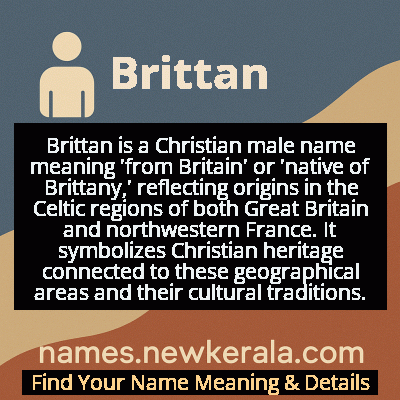Brittan Name Meaning & Details
Origin, Popularity, Numerology Analysis & Name Meaning of Brittan
Discover the origin, meaning, and cultural significance of the name BRITTAN. Delve into its historical roots and explore the lasting impact it has had on communities and traditions.
Name
Brittan
Gender
Male
Origin
Christian
Lucky Number
3
Meaning of the Name - Brittan
Brittan is a Christian male name meaning 'from Britain' or 'native of Brittany,' reflecting origins in the Celtic regions of both Great Britain and northwestern France. It symbolizes Christian heritage connected to these geographical areas and their cultural traditions.
Brittan - Complete Numerology Analysis
Your Numerology Number
Based on Pythagorean Numerology System
Ruling Planet
Jupiter
Positive Nature
Optimistic, inspirational, and creative.
Negative Traits
Scattered, exaggerating.
Lucky Colours
Yellow, gold, purple.
Lucky Days
Thursday.
Lucky Stones
Yellow sapphire.
Harmony Numbers
1, 2, 9.
Best Suited Professions
Arts, writing, communication.
What People Like About You
Creativity, optimism.
Famous People Named Brittan
Brittan Smith
Canadian musician
Lead vocalist of the band The Most Serene Republic and successful solo artist
Brittan Byrd
American football player
Played as defensive back for the New York Giants and Carolina Panthers in the NFL
Brittan Barker
American educator and administrator
Notable school principal and educational leader in California school districts
Brittan Sutphin
American model and actress
Featured in major fashion campaigns and television appearances
Name Variations & International Equivalents
Click on blue names to explore their detailed meanings. Gray names with will be available soon.
Cultural & Historical Significance
In Christian contexts, the name gained popularity during medieval times when Christian missionaries from both regions spread throughout Europe. The name symbolizes the Christianization of Celtic peoples and their integration into broader European Christian culture. Many early Christians bearing this name were involved in missionary work, particularly in the conversion of pagan tribes across Europe, making it a name associated with religious devotion and cultural bridge-building.
The name also reflects the complex history of Celtic Christianity, which maintained distinct traditions while remaining part of the broader Christian world. This dual identity—both Celtic and Christian—makes Brittan a name that speaks to cultural preservation amid changing religious and political landscapes.
Extended Personality Analysis
Individuals named Brittan are often perceived as having a strong sense of identity and cultural awareness, reflecting the name's geographical origins. They tend to be adaptable yet grounded, capable of navigating different social situations while maintaining their core values. This balance often makes them excellent mediators and communicators, able to understand multiple perspectives without losing their own standpoint.
Common traits include reliability, loyalty, and a practical approach to problem-solving. Brittan's are often seen as dependable friends and colleagues who value tradition but aren't afraid to embrace innovation when necessary. Their connection to both British and French Celtic heritage often manifests as an appreciation for history, storytelling, and cultural preservation, while their Christian background may influence a moral compass oriented toward community service and ethical leadership.
These individuals typically exhibit a blend of introspection and action—thoughtful about their decisions but decisive in implementation. The name suggests someone who honors their roots while looking forward, making them well-suited for roles that require balancing tradition with progress. Their inherent sense of cultural connection often gives them a global perspective and appreciation for diversity.
Modern Usage & Popularity
In contemporary usage, Brittan remains a relatively uncommon but recognizable male name, particularly in English-speaking countries with Celtic heritage connections. The name saw moderate popularity peaks in the 1980s and 1990s but has since become more distinctive due to its declining frequency. Modern parents choosing this name often appreciate its historical roots and cross-cultural significance, as well as its strong, traditional sound. It's frequently used by families with British or French ancestry who want to honor their heritage without choosing an overtly common name. The spelling 'Brittan' is less common than 'Britton' but maintains the same pronunciation and meaning. Current usage trends show it appearing more frequently in regions with strong Celtic cultural awareness, such as parts of Canada, Australia, and the American Northeast, where it serves as both a nod to ancestry and a distinctive personal identifier.
Symbolic & Spiritual Meanings
Symbolically, Brittan represents cultural duality and bridge-building between different worlds. The name embodies the concept of being rooted in tradition while adaptable to change, much like the Celtic peoples who maintained their identity across geographical displacements. It symbolizes resilience and cultural preservation in the face of external pressures. The Christian association adds layers of spiritual symbolism, representing faith as a guiding force through life's journeys and transitions. Metaphorically, the name suggests someone who can navigate between different cultural spheres while maintaining personal integrity, serving as a connector between traditions and modernity. The geographical origins also lend symbolic meaning related to boundaries—both the physical boundaries of coastlines and the cultural boundaries the name transcends—making it emblematic of someone who understands limits but isn't constrained by them.

